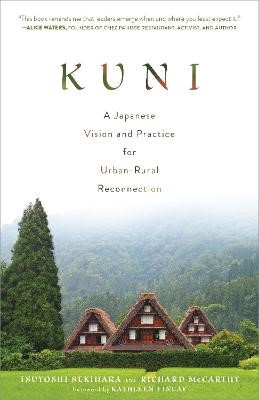author
Jacques Lawinski
post
- 17/08/2023
- No Comments
- Reviews
share
KUNI: A Japanese vision and practice for Urban-Rural Reconnection
By Tsuyoshi Sekihara and Richard McCarthy
North Atlantic Books, 2022.
Tsuyoshi Sekihara is a visionary rural development specialist in Japan, and Richard McCarthy is an environmental activist and writer, championing local food systems in the United States.

KUNI is the Japanese word commonly used for ‘country’. It also means community or group, which is the central theme of this book: stories of community and collaboration in rural Japan. An East-meets-West approach means that the book intertwines the stories of community-building in the United States through McCarthy’s more academic reflections, with the humble and grounded practical reflections from Sekihara in Japan.
The book relates the experiences of reviving rural communities in Japan and the United States, and how previously disappearing or declining communities have been able to turn their fortunes around. It is through a central administration for the community, offering services to the citizens and acting as manager for community projects, that these groups have been able to design strategies to rejuvenate their local resources, clean up their surroundings, and re-start local industries to gain independence, and fund their social services.
The central question in community building and resilience for Sekihara is the question of population size. How big is too big? And what about too small? Sekihara seems to think that around 2,000 people is a perfect size for a community: large enough to not end up with dictators, and small enough so that everyone’s needs are felt and ideas can be realised with the resources of the group.
This is a very practical book, with Sekihara referring often to the twelve functions that he has created for a Regional Management Organisation, or RMO, that manages the community. These include welfare, education, environmental protection and regeneration, as well as economic services and promotion of the region. Community functions like these develop slowly, through long discussions about the needs and goals of the community itself, and cannot be simply imposed upon a group of people. Sekihara also tells the stories of certain communities who didn’t manage to revive themselves, and explores the reasons for this.
A great book for anyone interested in community building, rural communities, and developing a self-sufficient lifestyle, with inspirational stories and practical tips. One must remember that they are not tips to simply be implemented, but tips to guide your thinking for your own community or group.
KUNI is available at Paper Plus NZ here, or check out your local bookshop to see if they have it in stock or can order it for you.
It took more than 30 hours of research and writing to produce this article, which will always be open and free for everyone to read, without any advertising.
All our articles are freely accessible because we believe that everyone needs to be able to access to a source of coherent and easy to understand information on the ecological crisis. This challenge that confronts us all will only be properly addressed when we understand what the problems are and where they come from.
If you've learned something today, please consider donating, to help us produce more great articles and share this knowledge with a wider audience.
Why plurality.eco?
Our environment is more than a resource to be exploited. Human beings are not the ‘masters of nature,’ and cannot think they are managers of everything around them. Plurality is about finding a wealth of ideas to help us cope with the ecological crisis which we have to confront now, and in the coming decades. We all need to understand what is at stake, and create new ways of being in the world, new dreams for ourselves, that recognise this uncertain future.
Copyright © Plurality.eco 2023

